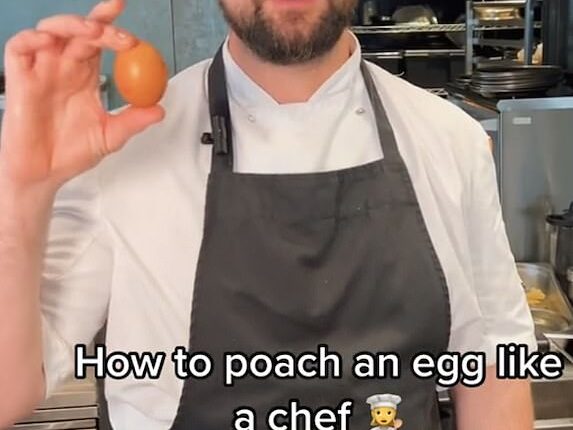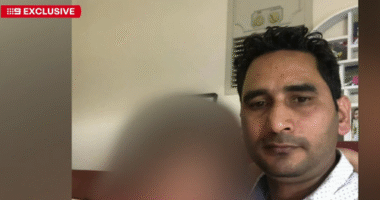For many people it’s the epitome of the ultimate brunch – a perfectly cooked poached egg with a golden, runny yolk.
The dish is a traditional favorite and is often deemed a fundamental part of a basic cooking skill set – nevertheless, many home chefs find it challenging to master.
Here comes valuable advice from a renowned chef who suggests that following a straightforward tip, incorporating a common household item while poaching your eggs, can lead to a flawless outcome every time.
A TikTok video shared by Fallow restaurant in London’s Haymarket explains the simple technique, making it look easy to get pro-level results.
Featuring Mark Gilmour, reportedly the former sous chef of the restaurant when the video was made, who later became the junior sous chef at the Waterman’s Arms in Barnes, you simply need to introduce a single basic ingredient into the water used for cooking.
That, he explained, is a drop of vinegar – which will make the whole gastronomic process much easier.
Opening the short clip, Mark introduced himself, before revealing he was going to demonstrate how to poach an egg.
He said the first step is to ‘get some vinegar water going’ – ie; bring your water with a drop of vinegar to the boil before breaking your egg into the pan.

A video (pictured) posted on Fallow Restaurant in London’s TikTok page showed a top tip for creating the perfect poached egg
Mark continued: ‘You want [the water temperature to be] around 85 to 90 degrees [and to cook the egg for] three minutes.’
The chef then tackled one of the debates people have – and often feel strongly about – when it comes to technique.
This is, of course, whether or not you need to stir the water during the three-minute cooking process.
According to Mark: ‘People always say you need to stir the water.
‘Personally, I don’t believe you really need to. If you’re not cooking with vinegar, I guess the stirring method could work, but I always use vinegar.
‘Just get it out of the water, plunge it right into ice water. There you go – perfectly poached egg.’
According to an academic at New Zealand’s Victoria University of Wellington, there is a scientific reason why using vinegar can help you cook the perfect poached egg.
Dr Robert Keyzers, from Te Wānanga Matū – School of Chemical and Physical Sciences, explained: ‘On the inside of your standard chicken egg we have two main components. We have the egg yolk and then we have the egg white.

After cooking the egg (pictured) sous chef Mark plated it, before cutting into it, and describing it as ‘perfectly poached’
‘The egg white itself is comprised of a bit of water and mostly a protein called ovalbumin. When you start to heat up a protein like ovalbumin something called denaturation starts to occur and that’s when the protein breaks down and it starts to solidify. But we can also do denaturing in other ways. The other way is to increase the acidity of how you’re cooking it.
‘Vinegar is an inherently acidic material, so if we add a few drops of vinegar into that boiling water that is going to increase the rate of denaturing and it’s going to make that happen faster and help the poached egg hold its shape better.’]
However, not everyone is a fan of the vinegar technique, with some preferring to use just water.
Michelin-starred chef Paul Foster, who heads the fine dining restaurant Salt in Stratford-upon-Avon posted a video on TikTok detailing the step-by-step method he prefers.
Speaking in the 2022 clip, Paul acknowledged that the perfect poach is a ‘nemesis for a lot of people’.
However, he explained, there isn’t actually much to it. He said in the clip that all you need is a pot of boiling water, a sprinkle of salt, the freshest egg and most importantly – and controversially – no vinegar.
Paul added that after adding the egg to boiling water, he suggests setting a two-minute timer, before removing the egg and placing it on a kitchen towel.
He explained: ‘I’m going to show you how to make the perfect poached egg. I know it’s a nemesis for a lot of people.

Paul Foster (pictured) who heads the fine dining restaurant Salt in Stratford-upon-Avon, revealed his special technique for making poached eggs in a 2022 TikTok video – revealing that he does not use vinegar – although he said was trained to do so when he was a young chef
‘Pan of water. Do not add vinegar. Whatever people tell you, you do not need it…[instead just add a] pinch of salt.’
As the water bubbled away in a pot on the stovetop, Paul cracked his egg into a sieve, which was resting atop a bowl. He recommended using the freshest egg possible for the best results.
The rationale for cracking it into a sieve and not straight into the water was to ‘get off any watery bits [from] the [egg] white’.
Before submerging the egg, he instructed viewers to turn the water down to ‘just under the boil’, then, he said, ‘give it a stir. You don’t need to whisk it or create a vortex’.
Stirring the water gently means there is movement, so that when cooks follow the next step – dropping the egg into the hot water, it doesn’t stick to the bottom of the pan. Instead, the protein sets and the water’s movement means it ‘curls up lovely’, according to Paul.
He instructed viewers to set a timer for while the egg is in the pan, and advised viewers to keep an eye on it during the cooking process, not walking away.
Next, he said, set a two-minute timer. ‘It’s not going to be long enough, but I always like to check it before [it’s finished],’ he said.
During the two minutes, he focused the camera on the pan, saying: ‘See how that water is not boiling – there’s no vinegar in there. It’s not gone all scummy, it’s not going to taste like c**p.

He instructed viewers to set a two-minute timer, but warned it may take a little longer to to get the ‘perfect’ poached egg
‘Now I was shown when I was a young chef to use vinegar, but I’ve learnt a better way. This is the better way,’ he added.
Paul checked the egg after two minutes, lifting it out of the pan with a slotted spoon and gently wobbling it. He was unsatisfied with the results, saying it appeared to be a little raw, so he popped it back in the boiling water, adding an additional 30 seconds to the timer.
‘Don’t be tempted to turn it up and start boiling it’ he warned. Showing the egg, which remained stationary in the water, which was not boiling, Paul noted: ‘See it’s still just standing there.’
Lifting it out of the water after the 30 seconds was up, he gently wobbled the egg on the slotted spoon again, showing that the texture was visibly firmer.
‘Now that looks perfect,’ he observed. Removing the egg from the pan, he placed it on some kitchen paper, saying freshly poached eggs should never be put directly on toast as this will make the bread soggy.
This is the time to season it, according to Paul, who noted that salt and cracked white or black pepper are ‘all you need’.
Being placed on the kitchen paper meant the excess water had now drained off the egg and it was ready for plating, with whatever other ingredients – like toast, bacon, or avocado – the diner may prefer.
To conclude the video, Paul cut into the runny yolk, commenting: ‘You can see that is a perfect poached egg, you don’t need a microwave, you don’t need one of those stupid egg poachers. You just need a pan with some water, with no vinegar in, a little bit of salt.’
Referring to his creation, he added: ‘That is a perfectly cooked [poached egg with] a runny yolk, and a nice, soft white. You can’t get better than that.’



More than 8,000 comments poured in – some said their minds were blown by Paul’s vinegar-less method
The final step was to taste the egg. Taking a bite, he savoured it, before saying: ‘Eggs don’t come better. Follow my masterclass.’
Paul’s video attracted nearly 9,000 comments, with viewers thanking the chef for his tips. Clearly impressed by his technique, one person wrote: ‘They turned out perfectly, finally a good method, thank you.’
‘As a chef I completely agree with this! No need for vinegar,’ said another.
Someone else added: ‘Putting it on kitchen roll first is a game changer! Hate it when my toast gets wet.’
And a further grateful commentator wrote: ‘Hey, thanks man, been struggling for years to get this right, just tried your method and it worked like a charm, cheers.’










